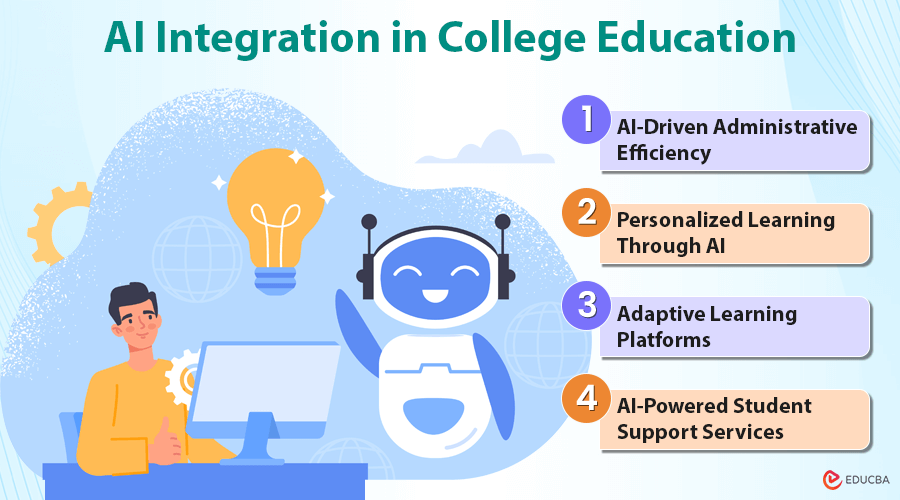
AI in College Education: Overview
Artificial Intelligence (AI) is transforming higher education, redefining student learning, teaching methods, and institutional operations. AI in College Education enhances efficiency, personalizes learning, and provides better student support services. This article explores AI’s role in transforming the college experience and its future implications.
AI Integration in College Education
#1. AI-Driven Administrative Efficiency
Colleges are leveraging AI to streamline various administrative tasks, such as:
- Automated Admissions Processing: AI assists in evaluating applications efficiently.
- Smart Scheduling: AI optimizes course schedules based on student and faculty availability.
- Efficient Resource Management: AI helps manage libraries, hostel facilities, and campus security.
By automating these processes, institutions can improve efficiency, reduce costs, and enhance student experiences.
#2. Personalized Learning Through AI
AI has significantly impacted teaching and learning by providing intelligent tutoring systems that adapt to each student’s needs. Benefits include:
- Interactive Learning: AI-driven simulations and virtual labs make subjects more engaging.
- Tailored Feedback: AI evaluates student progress and provides personalized recommendations.
- Enhanced Accessibility: AI-powered tools support students with disabilities through voice assistants and transcription services.
#3. Adaptive Learning Platforms
AI-based platforms like Knewton and Smart Sparrow analyze student interactions and adjust real-time content difficulty. This ensures that:
- Students learn at their own pace.
- Educators identify learning gaps early.
- Course content is customized based on individual strengths and weaknesses.
Additionally, students seeking academic support can use WriteMyEssay to simplify their writing process and enhance the quality of their work.
#4. AI-Powered Student Support Services
1. Virtual Assistants for Students
AI-driven virtual assistants help students manage academic and campus life by:
- Providing instant responses to queries about coursework, deadlines, and campus services.
- Assisting with course registration and academic advising.
- Sending reminders for assignments and exams.
These assistants, available 24/7, enhance student convenience and reduce administrative workload.
2. AI-Based Mental Health Support
College students often experience academic stress. AI-driven tools like Woebot provide mental health support through:
- Confidential Chatbots: Offering emotional support and mindfulness strategies.
- Personalized Coping Mechanisms: Based on student interaction patterns.
- Immediate Access to Resources: AI connects students with mental health services when needed.
AI in Academic Performance and Assessment
1. Predictive Analytics for Student Success
AI evaluates student data to forecast academic performance and detect those at risk of struggling. Colleges can:
- Implement early intervention programs.
- Provide personalized academic plans.
- Improve overall graduation rates by addressing learning challenges proactively.
2. Automated Grading Systems
AI tools like Gradescope enhance grading efficiency by:
- Reducing Instructor Workload: Automating the evaluation of assignments and exams.
- Ensuring Unbiased Assessment: Eliminating human grading inconsistencies.
- Providing Instant Feedback: Allowing students to understand their mistakes and improve.
Ethical Considerations of AI in College Education
1. Data Privacy and Security
As AI gathers and examines extensive student data, institutions need to address:
- Unauthorized Access: Implementing strict cybersecurity measures.
- Transparency: Educators ensure that students understand how their data is used.
- Informed Consent: Obtaining explicit permission before collecting personal data.
2. Fairness and Bias Prevention
Developers must carefully design AI algorithms to prevent admissions, grading, and career counseling biases.
- Regular AI Audits: Ensuring algorithms remain fair and unbiased.
- Diverse Data Sets: Training AI models on inclusive datasets.
- Stakeholder Involvement: Encouraging faculty and students to participate in AI governance.
Future Innovations in AI and Higher Education
1. Virtual Reality (VR) in Classrooms
The fusion of AI and VR creates immersive educational experiences. Students can:
- Conduct virtual science experiments in simulated labs.
- Explore historical sites through VR field trips.
- Engage in interactive problem-solving scenarios.
2. AI-Driven Career Counseling
AI is transforming career services by:
- Analyzing Market Trends: Matching students with in-demand career paths.
- Personalized Job Recommendations: Based on students’ skills and interests.
- Resume and Interview Coaching: AI-powered platforms provide automated career guidance.
Final Thoughts
The adoption of AI in college education has brought significant advancements, including more personalized learning by tailoring education to individual student needs, increased administrative efficiency through automation that reduces costs and errors, and enhanced student well-being with AI-driven mental health support and career counseling.
Recommended Articles
We hope this guide on AI in College Education has provided valuable insights. Check out these recommended articles for more expert tips on AI-driven learning, educational technology trends, and student success strategies.


